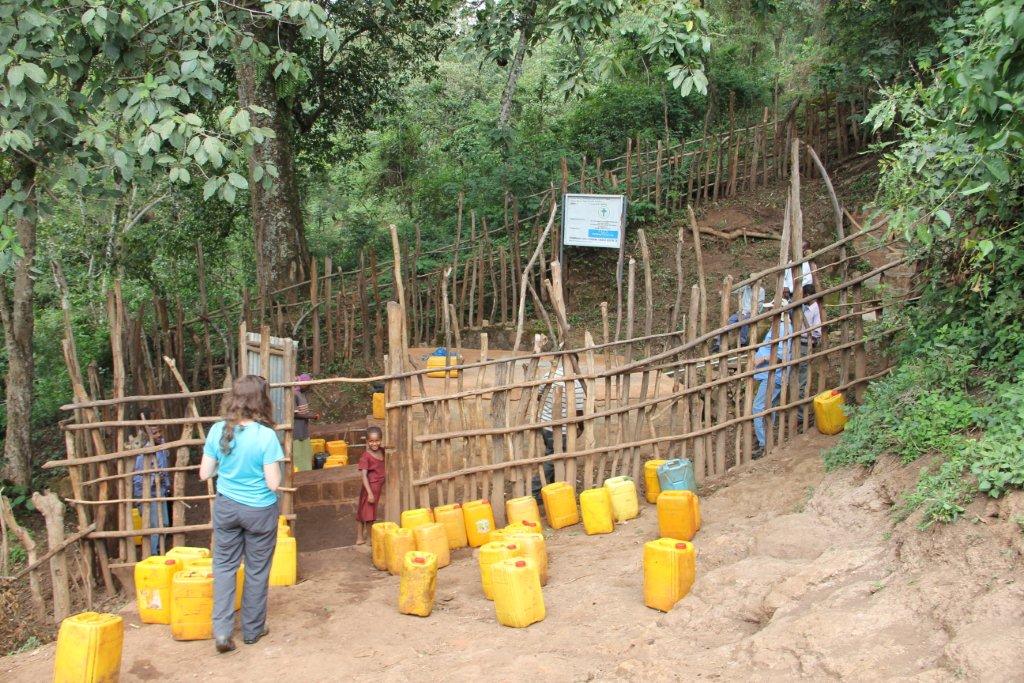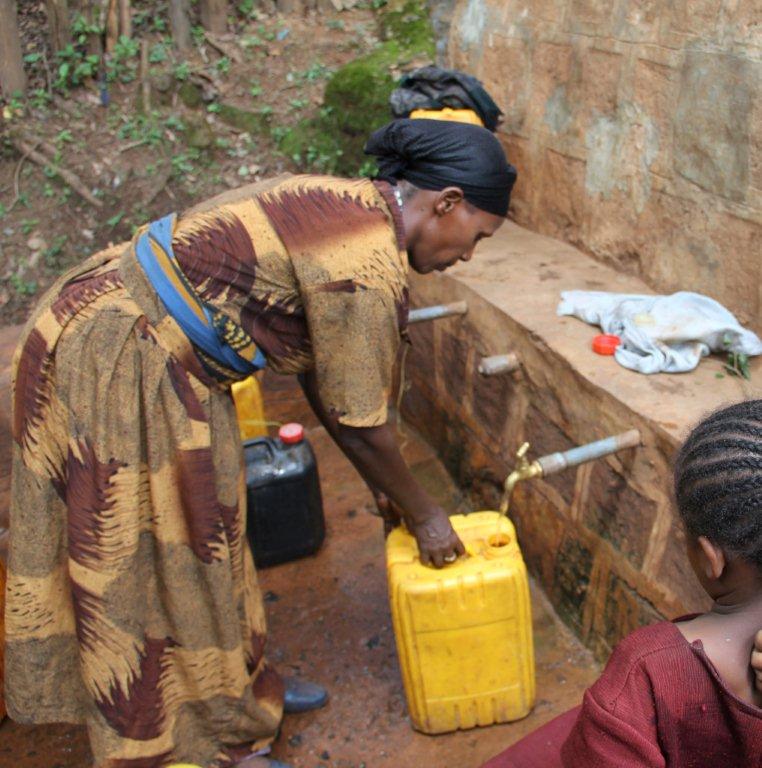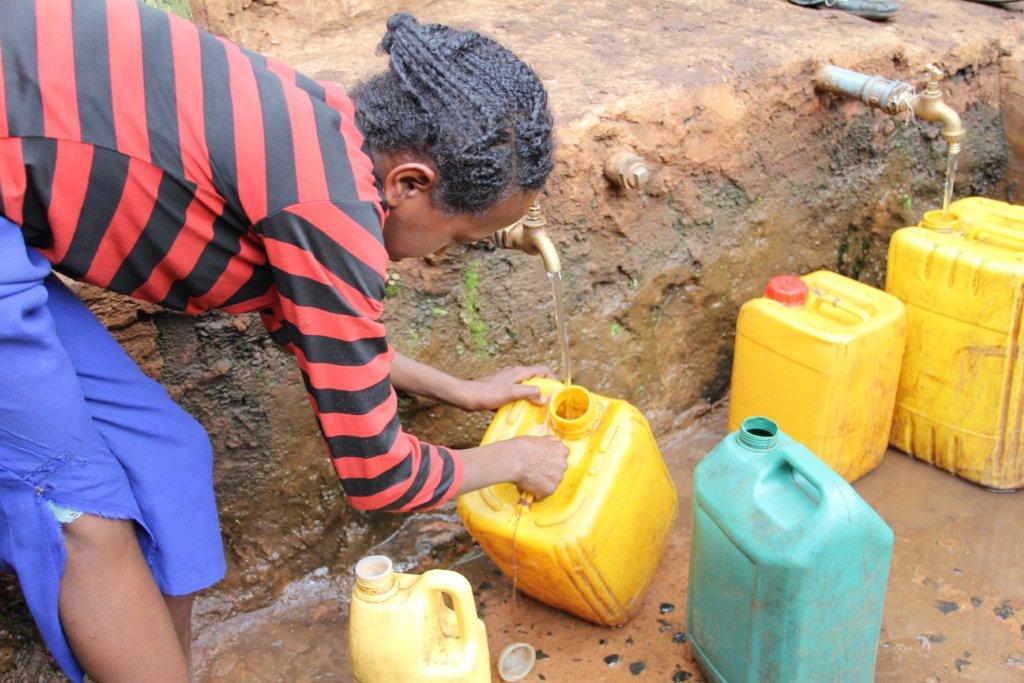We got an early morning start today as we were going to be "in the field" visiting water projects with our implementing partner, the Development and Social Services Commission (DASSC) of Mekane Yesus (Ethiopian Lutheran Church). We have implemented a total of about 25 projects in this area during that time, and DASSC has recently completed 11 such projects earlier in 2012.
We met the DASSC program manager for water, Bikila, at our hotel in Ambo and started for Ejajii about 7:45 am. We’ve been working with the DASSC staff at Central Gibe Synod over the last 30 months or so. We got to the Synod office in Ejajii after about 3 hours driving, the last 1/3 is under construction for replacement and pretty challenging. Our group was greeted by some of the Synod staff who will accompany us on visits to the communities.
Two members of our group, Eleanor and Jan, brought a suitcase full of school supplies and dental supplies on the trip. They decided this was a perfect opportunity to provide some additional support for the school children of the Synod, so they left the materials with the President of the Synod to distribute to the schools in greatest need. They were very grateful for the items and will put them to good use.

Jan and Eleanor present supplies to Mekane Yesus in Ejajii
After that, everyone piled into the DASSC team’s two Toyota land cruisers (4WD) since our van couldn’t make it to some of the rural areas we were visiting. The rural roads are unpaved and can be very bumpy. Our first stop is at the project site for the community of Sayo. It is a spring protection system located near the village, down a fairly steep path. We were amazed at the number of members using the project, a lot of empty jerry cans going down the path, and full ones coming up! The community expressed it appreciation and thankfulness for the clean water and the benefits it was bringing to the community.

Sayo spring protection system
At this site, Jill spent some time visiting with one of the female Water Committee members, Diribe. Before the spring protection system was completed, she told us, "We were expected to come in the midnight because there were a lot of people waiting for this unprotected water source. That was beyond the capacity of the water source’s output. It was difficult to access water, especially in the dry season. Now thanks to this project we are getting pure water within a manageable distance and whenever we like."

Diribe collecting water
Our next stop was at the project site of Sayo Gudatu. This project is also a spring protection system, and a water trough for the cattle had been built with this project as well. We spoke with several community member who were busy collecting water for their families, all of whom expressed great joy over the presence of their new clean water source.

Gathering water at Sayo Gudatu
Our time in the field was cut short as several dark clouds came up on the horizon and rain drops started to fall. The remoteness of our location (down a path through the adjacent fields) made a treacherous retreat back to the gravel road. After our drivers put the vehicles in the 4WD mode, we made it out with just a bit of slipping and sliding.
As we headed back to Ambo, we visited the village of Midakeng, also located in the Central Gibe Synod. This is an area without any sustainable clean water sources for its community members. We were able to meet with the leadership of the local district who explained the lack of potable water for this area. This area could represent a future project area for Water to Thrive. We made our way back to Ambo, tired after a long day of driving, but joyous to have been able to experience firsthand with the community members the blessings of clean, safe water.
We got an early morning start today as we were going to be "in the field" visiting water projects with our implementing partner, the Development and Social Services Commission (DASSC) of Mekane Yesus (Ethiopian Lutheran Church). We have implemented a total of about 25 projects in this area during that time, and DASSC has recently completed 11 such projects earlier in 2012.
We met the DASSC program manager for water, Bikila, at our hotel in Ambo and started for Ejajii about 7:45 am. We’ve been working with the DASSC staff at Central Gibe Synod over the last 30 months or so. We got to the Synod office in Ejajii after about 3 hours driving, the last 1/3 is under construction for replacement and pretty challenging. Our group was greeted by some of the Synod staff who will accompany us on visits to the communities.
Two members of our group, Eleanor and Jan, brought a suitcase full of school supplies and dental supplies on the trip. They decided this was a perfect opportunity to provide some additional support for the school children of the Synod, so they left the materials with the President of the Synod to distribute to the schools in greatest need. They were very grateful for the items and will put them to good use.

Jan and Eleanor present supplies to Mekane Yesus in Ejajii
After that, everyone piled into the DASSC team’s two Toyota land cruisers (4WD) since our van couldn’t make it to some of the rural areas we were visiting. The rural roads are unpaved and can be very bumpy. Our first stop is at the project site for the community of Sayo. It is a spring protection system located near the village, down a fairly steep path. We were amazed at the number of members using the project, a lot of empty jerry cans going down the path, and full ones coming up! The community expressed it appreciation and thankfulness for the clean water and the benefits it was bringing to the community.

Sayo spring protection system
At this site, Jill spent some time visiting with one of the female Water Committee members, Diribe. Before the spring protection system was completed, she told us, "We were expected to come in the midnight because there were a lot of people waiting for this unprotected water source. That was beyond the capacity of the water source’s output. It was difficult to access water, especially in the dry season. Now thanks to this project we are getting pure water within a manageable distance and whenever we like."

Diribe collecting water
Our next stop was at the project site of Sayo Gudatu. This project is also a spring protection system, and a water trough for the cattle had been built with this project as well. We spoke with several community member who were busy collecting water for their families, all of whom expressed great joy over the presence of their new clean water source.

Gathering water at Sayo Gudatu
Our time in the field was cut short as several dark clouds came up on the horizon and rain drops started to fall. The remoteness of our location (down a path through the adjacent fields) made a treacherous retreat back to the gravel road. After our drivers put the vehicles in the 4WD mode, we made it out with just a bit of slipping and sliding.
As we headed back to Ambo, we visited the village of Midakeng, also located in the Central Gibe Synod. This is an area without any sustainable clean water sources for its community members. We were able to meet with the leadership of the local district who explained the lack of potable water for this area. This area could represent a future project area for Water to Thrive. We made our way back to Ambo, tired after a long day of driving, but joyous to have been able to experience firsthand with the community members the blessings of clean, safe water.

About The Author: Jillh
More posts by jillh